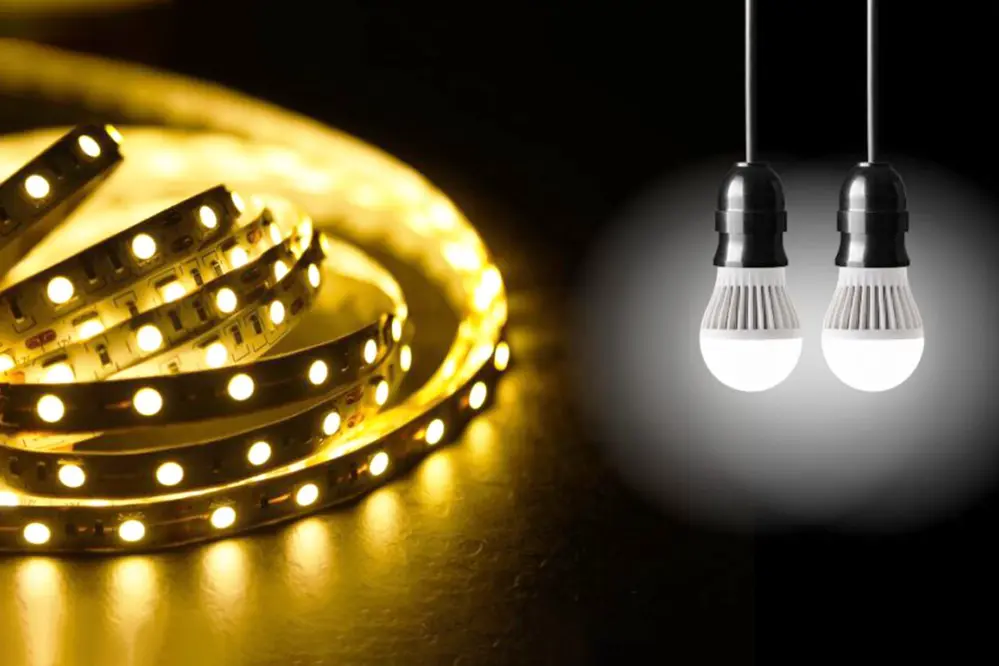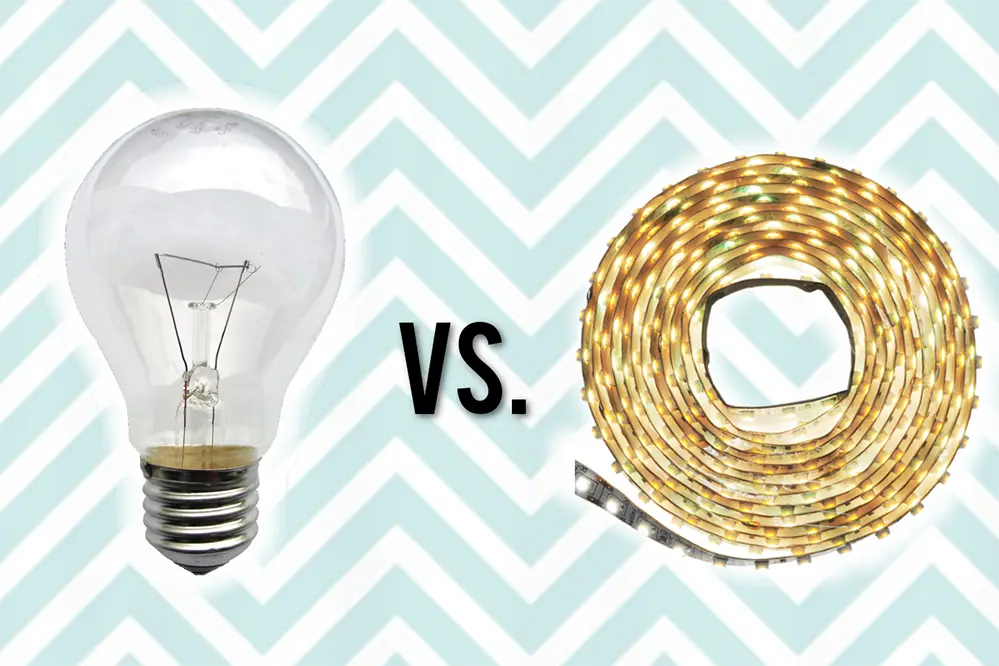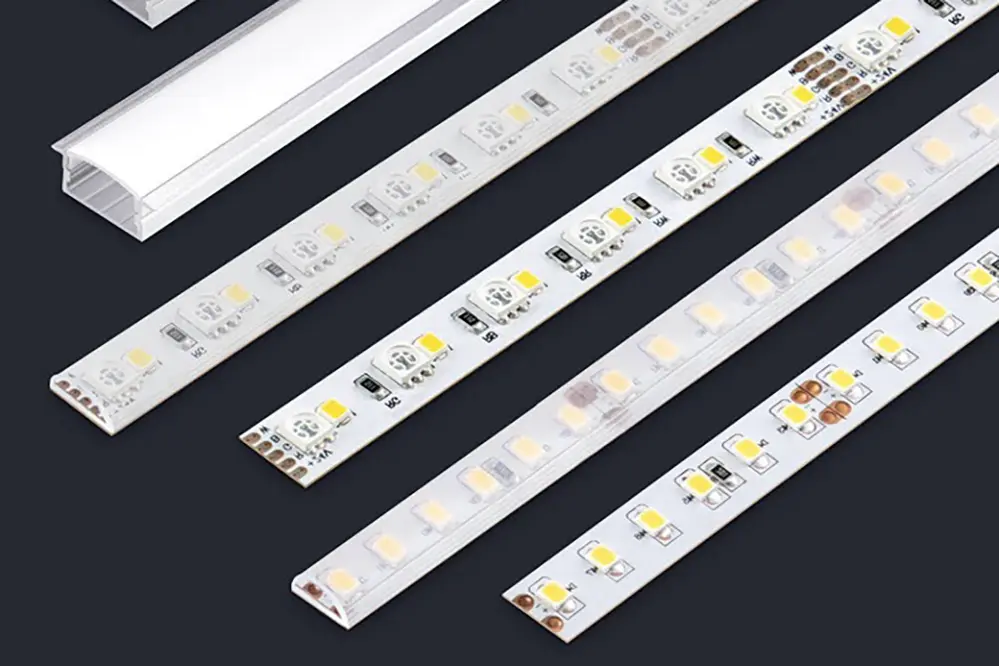In the ever-evolving world of home lighting, the debate between LED strip lights and bulbs takes center stage. These two contenders, each with their distinct charm and functionality, offer diverse ways to illuminate spaces with efficiency and style. LED technology has revolutionized lighting, combining energy-saving features with aesthetic appeal, a key consideration for both homeowners and designers alike.
While LED bulbs bring the familiarity and ease of traditional bulbs into the modern era, LED strips offer unparalleled flexibility, perfect for creative and ambient lighting solutions. This contrast presents a unique choice for those looking to enhance their living or workspaces. Whether it’s the focused brightness of a bulb or the ambient glow of a strip, each has its role in crafting the perfect atmosphere.
Understanding the strengths and applications of each option is crucial in making an informed decision. Let’s dive right in!
Understanding LED Strips
LED strips are a revelation in the world of lighting, offering unparalleled flexibility and creativity in their application. Unlike rigid lighting solutions, these strips can be curved around corners, fitted into tight spaces, and even wrapped around objects, making them perfect for enhancing the aesthetics of any room. They come in various colors and brightness levels, which allows for precise mood settings, whether it’s a warm, cozy glow or a vibrant, energetic ambiance. Their ease of installation is another bonus. With adhesive backing and the ability to be cut to length, LED strips can transform any space without the need for complex wiring or professional installation. This adaptability makes them ideal for DIY enthusiasts looking to add a personal touch to their home or workspace.
Exploring LED Bulbs
LED bulbs represent a significant leap from traditional lighting methods. Not only do they offer the familiar form factor of conventional bulbs, but they also bring advanced features like remote control and a spectrum of color options. Their ability to connect to smart home systems means you can control the lighting of your home from anywhere in the world. Imagine adjusting the brightness, changing colors, or even scheduling your lights to turn on or off, all from your smartphone. This level of control and customization makes LED bulbs not just a lighting choice but a lifestyle enhancement. Additionally, they are designed to fit into existing fixtures, ensuring a seamless transition from older bulbs to these newer, more energy-efficient options. Whether you’re reading a book, hosting a dinner party, or relaxing at home, smart LED bulbs can create the perfect atmosphere for every occasion.
Comparing LED Strips and Bulbs
Light Quality and Intensity
The difference in light quality and intensity between LED strips and bulbs, catering to diverse lighting needs, is quite stark. LED bulbs are engineered to disperse light more broadly, making them suitable for general room illumination. They offer a consistent light output that mimics traditional bulbs but with the added benefits of LED technology. LED strips, in contrast, provide a more focused and directional light. They are excellent for creating accent lighting, underlining architectural details, or adding a subtle glow to specific areas. This ability to direct light precisely makes them ideal for task lighting, under-shelf illumination, or even backlighting for TVs and monitors.
Energy Efficiency and Power Consumption
When it comes to energy efficiency, both LED strips and bulbs shine brightly. They use far less power than their incandescent or halogen counterparts, leading to significant energy savings. This is particularly beneficial in reducing both household and business electricity costs. LED strips, due to their low power requirement for accent lighting, are exceptionally efficient. On the other hand, LED bulbs, while consuming slightly more power, still represent a massive improvement in efficiency over traditional bulbs. The reduced power consumption of both types contributes to a decrease in greenhouse gas emissions, making them an environmentally responsible choice.
Durability, Lifespan, and Eco-friendliness
The durability and lifespan of LEDs are one of their most significant advantages. LED strips and bulbs are built to last, often running for tens of thousands of hours before needing replacement. This longevity means less frequent replacements, reducing waste, and saving resources. Furthermore, LEDs don’t contain harmful substances like mercury, found in some traditional bulbs, making them a safer and more eco-friendly option. Their long life and lack of toxic materials make them a sustainable choice for both the environment and consumers.
Aesthetics, Design Flexibility, and Smart Features
LEDs, particularly strips, offer incredible design flexibility, opening up a world of creative possibilities for lighting design. They can be tucked away under cabinets, along staircases, or even used for cove lighting, providing an elegant and modern aesthetic. Smart LED bulbs bring another level of functionality with features like color-changing abilities, dimming options, and integration with home automation systems. This allows for dynamic room settings, mood lighting, and even syncing lights with music or TV shows. The ability to control these settings through smartphone apps or voice commands adds a layer of convenience and technological sophistication.
Installation, Maintenance, and Cost Analysis
Ease of Installation and Setup
Installing LED strips might seem daunting at first, but it’s a relatively straightforward process once you understand the basics. It involves selecting the right location, ensuring a clean surface for the adhesive, and connecting to a power source. Some installations may require additional steps, like soldering or wiring to a dimmer switch, but these are generally manageable for those with basic DIY skills. In comparison, LED bulbs are a breeze to install – it’s as simple as screwing in a bulb. This ease of installation makes LED bulbs a universally appealing choice for quick lighting upgrades.
Maintenance Requirements and Longevity
One of the standout features of both LED strips and bulbs is their minimal maintenance requirements. Thanks to their solid-state construction, they are less prone to breakage and wear than traditional bulbs. LED strips may need occasional cleaning to maintain optimal brightness, especially if installed in high-dust areas. The long lifespan of LEDs means you’ll rarely need to replace them – some can last over 50,000 hours. This longevity not only makes them more convenient but also more environmentally friendly, as it reduces waste.
Initial Costs vs. Long-term Savings
The upfront cost of LED lighting, particularly high-quality strips or advanced smart bulbs, can be higher than traditional lighting. However, this initial investment quickly pays off. LEDs consume much less energy, which means lower electricity bills. Additionally, their long lifespan reduces the need for frequent replacements, saving money in the long run. This makes LED lighting not just an environmentally responsible choice but also a financially smart one over time.
Energy Efficiency Deep Dive
Delving deeper into the energy efficiency of LEDs, it’s important to note how they achieve such remarkable performance. LEDs use a fraction of the electricity compared to traditional bulbs, largely due to their ability to convert more energy into light with minimal heat loss. Factors like brightness (measured in lumens), color temperature (measured in Kelvin), and usage (hours of operation) impact their energy consumption. Typically, an LED’s power consumption is significantly lower, making it an ideal choice for both frequent and infrequent use settings.
Smart Lighting: Bulb or Strip?
Smart lighting takes the capabilities of LEDs a step further. Smart bulbs, like those that integrate with home automation systems, offer a high level of convenience. They can be controlled via smartphone apps, voice commands, or even remotely, giving users the ability to adjust lighting settings without physical interaction. LED strips in the smart lighting category bring a different flavor, offering dynamic ambiance and the ability to transform spaces with color and light patterns. The choice between smart bulbs and strips hinges on your specific needs, whether you prioritize straightforward, functional lighting or creative, mood-enhancing features.
Making the Right Choice for Your Environment
Choosing between LED strips and bulbs boils down to the specific requirements of your space and personal preferences. For task-oriented areas like reading nooks or kitchens, smart bulbs provide clear, adjustable lighting. LED strips are unparalleled for creating an atmosphere or highlighting architectural features. They offer a unique way to enhance the aesthetic appeal of a space. When making your decision, consider factors like the area’s size, the type of activities typically performed there, and the desired ambiance. This thoughtful approach ensures that your choice aligns perfectly with your lifestyle and lighting needs.
Conclusión
In conclusion, whether you’re drawn to the practical elegance of LED bulbs or the creative versatility of LED strips, your journey to a brighter, more efficient future is illuminated with these innovative lighting solutions.
As you ponder your options, remember that Unitop, one of China’s leading manufacturers in this field, stands at the forefront of LED technology. Specializing in Tiras de luces LED y Flexo de neón LED, Unitop combines cutting-edge design with unparalleled quality. For those of you with further inquiries or specific lighting requirements, don’t hesitate to póngase en contacto con Unitop. With their expertise and commitment to excellence in the LED industry, Unitop is more than equipped to help you navigate the vibrant world of LED lighting. Contact us immediately to light up your space with innovation and style!
Puestos relacionados
Explorar todas las tiras LED Unitop

Tom es ahora el Director de Ventas de Unitop (China) Co., Limited. Ha estado en el Iluminación LED industria desde 2005. Es experto en ventas y marketing, y en gestión de fábricas. Le gusta el culturismo, ¡y también es un fan loco de Apple! Es un tipo muy trabajador y le encanta aprender y probar cosas nuevas.
Correo electrónico: tom@unitopledstrip.com WhatsApp: +86-18680307140






Dejar un comentario
¿Quieres unirte a la conversación?Siéntete libre de contribuir!